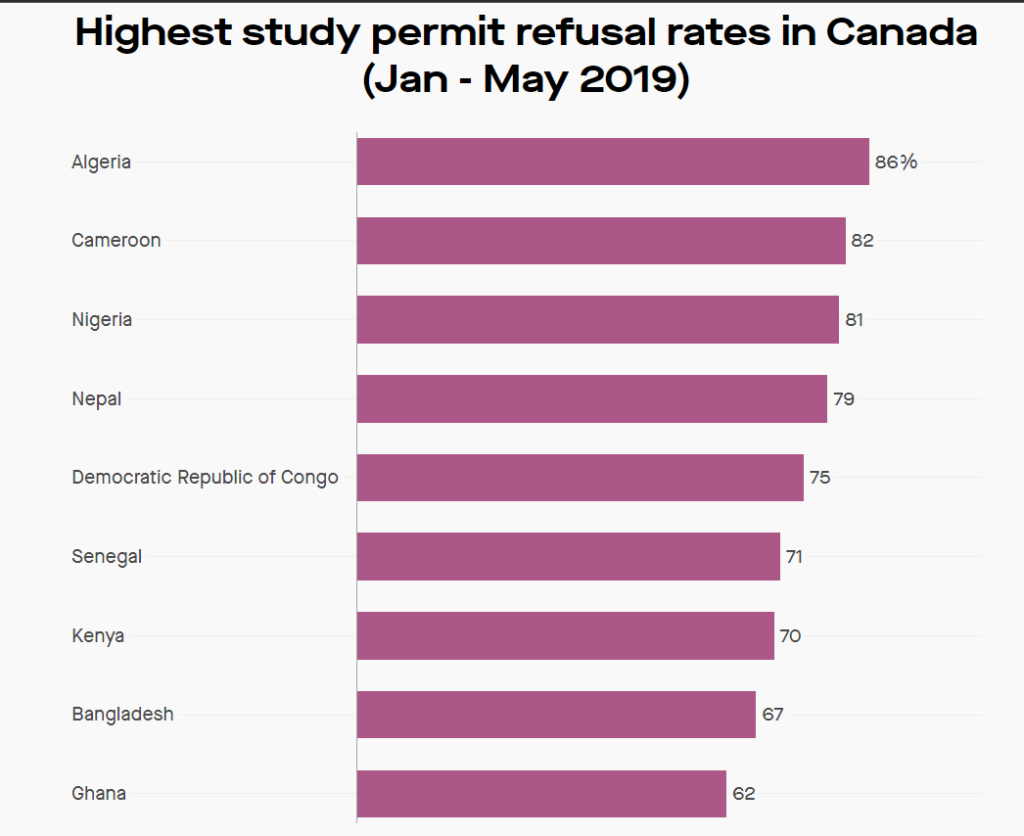
Students from French-speaking African countries are reportedly facing higher Canadian visa refusal rates compared to other nations, said international education stakeholders. They warned this might jeopardise Canada’s recruitment efforts and reputation as a welcoming study abroad destination.
“Each rejection letter is not only personally devastating for the student who has successfully qualified for admission to a Canadian institution, but each rejection also arguably represents a failure of process, a waste of resources for the student and the institution,” Canadian Bureau for International Education president and chief executive officer Larissa Bezo was quoted saying by The PIE News.
Canada must be “mindful that these failures of process do not end up being interpreted by potential international student candidates as failures of respect,” said Bezo, adding that the reputational risks for the Canada brand are significant.

A chart showing the highest study permit refusal rates in Canada from January to May 2019. Source: Yomi Kazeem/Quartz Africa
The high Canadian visa rejection rates are nothing new. According to a 2019 Immigration, Refugees and Citizenship Canada (IRCC) analysis, three in four African students (75%) who applied for Canadian study permits in Canada between January and May that year were rejected.
Prospective international students from Algeria, Cameroon and Nigeria suffered the highest rejection rates.
 Several experts, student advocates and associations have reportedly been in talks with government officials regarding Canadian visa rejection rates.
Several experts, student advocates and associations have reportedly been in talks with government officials regarding Canadian visa rejection rates.
Changes needed
Universities Canada president Paul Davidson said the high refusal rates among priority markets, particularly in Francophone Africa, are an “urgent challenge we need to address”, adding that a “collaborative effort” is needed.
The Canadian Alliance of Student Associations (CASA) said the issue needs “fundamental changes”, including an increase in IRCC resources. “International students of both official languages face many other barriers when applying for study permits, the process continues to be extremely onerous for any young adult unfamiliar with the Canadian immigration system to understand,” said CASA chairman Christian Fotang.
Reasons behind the high rejection rate among African countries could include in-country processing, suggested Lou Janssen Dangzalan, an immigration lawyer at LJD Law. He said in-country processing could mean “decision makers are more attuned to the realities on the ground”, while inter-African racism may also pose a problem.
Canadian visa assessed ‘equally’, says IRCC
In response to The PIE News’ queries, IRCC said all Canadian study permit applications are assessed equally and against the same criteria, regardless of the country of origin.
A spokesperson told the portal that visa applications are “considered on a case-by-case basis” and that decisions are “made by highly-trained officers who carefully and systematically assess each application” against the criteria set out in the Immigration and Refugee Protection Act.
The spokesperson added that the approval rate for study permit applications from applicants residing in French-speaking countries in Africa is comparable to the approval rate for all other African countries.










